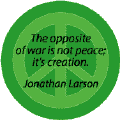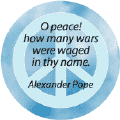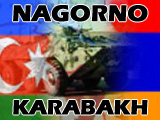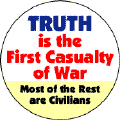Is Peace more than absence of the War?
There is no way to peace. Peace is the way. (Mahatma Gandhi)
| AR |
Ironically The International Day of Peace occurs annually on September 21st – ironically on 21 September 1980 Iraq launched a full-scale invasion of Iran, which was the beginning of an 8-year-long bloody war between the two countries. International Day of Peace is also a Day of Ceasefire so a simple definition for peace could mean absence of the war. In my opinion it should be more, it should have more ambitious aims and ideals. I call this value added peace with term “quality peace”. Some aspects of this context may clarify what does this term signify.

Peaceful conditions may reflect totalitarianism
The great armies, accumulated to provide security and preserve the peace, carried the nations to war by their own weight. (A. J. P. Taylor)
Peaceful society with low crime records (excluding state-terror which is not recognized as crime) can same time be a totalitarian state based to fear. Totalitarian dictatorship can limit its dominance to enslavement of citizens inside their country (Myanmar could an example) but it can be seen also as thread to other societies and this can erupt as violence even war (like peaceful North Korea).

Stability can also be bought by some economical benefits or it can be brought by foreign military force. In both cases real conflicts can be hidden from sight, however sustainability may be questionable.
Frozen conflict
We must recognize the chief characteristic of the modern era--a permanent state of what I call violent peace. (Admiral James D. Watkins)
A frozen conflict can give an illusion of permanent peace. Events in Balkans give a good example. After bloody war in Bosnia Dayton agreement brought peace. It was possible because before Dayton the war (1992-95) had almost finished ethnic cleansing/transfer of populations so drawing new administrative boundaries according ethnic groups was not big deal. Even in this context peace deal hardly can keep artificial “state” together – it can disrupt any time. (More Bosnia collapsing?)
Other example about frozen conflict is Kosovo. One can show from statistics that also in Kosovo prevails peace. Why, not because there is multi-ethnic and tolerant society, but because other than Albanian ethnic groups were kicked out to enclaves, north Kosovo or totally out from province. Former Serbian province is now international protectorate where northern part continues to be integrated with Serbia as it always has been and southern part has some delusion about independence. (More e.g. in “Kosovo: Two years of Pseudo-state” ). If the status of Kosovo can not be agreed between Pristina and Belgrade there is a possiblity that today's pseudo-state may become next “failed” or “captured” state.
pseudo-state may become next “failed” or “captured” state.
Other quite stable but however frozen conflicts one can mention Abkhasia, South Ossetia, Nagorno-Karabah and Transdnistria.
Defending peace with cluster bombs
The basic problems facing the world today are not susceptible to a military solution. (John F. Kennedy)
Most independent states suppose that peace can be kept with help of credible army; some countries believe that an attack is the best defence. The bigger countries feel more secure when they keep contol in their sphere of influence, with military force if needed. The real superpower may have strategic concept that the whole world is her sphere of influence so e.g. U.S can freely attack anywhere on the globe – to secure peace.
The used operational chart with last big conflicts has been following:
1st creating imaginary thread (Iraq/WMD, Afghanistan/Taliban, Balkan Wars/ethnic cleansing...),
2nd destroying the enemy by cluster bombs, depleted uranium war heads, contract killing, torture etc.,
contract killing, torture etc.,
3rd bringing democracy and stability in form of puppet governments and ousting local more or less selected authorities.
Official high flown statement of course are speaking humanitarian intervention, peace enforcement, defending democracy etc to hide real motivations.
Money talks, peace is bystander
War is never economically beneficial except for those in position to profit from war expenditures. (Congressman Ron Paul)
Peace work has one problem - it is not profitable, killing is at least from materialistic point of view. The world’s military spending is some 1.2 trillion, the OECD Development 106 billion, Peace work 6 billion and 0.6 billion of conflict prevention. The international community is willing to invest 200 times more to the war than peace.  Peace Research, could help prevent conflicts, but development of tools for killing is much more lucrative. Against one peace researcher, is estimated to be more than 1100 researcher for weapon (and their use) developers. The difference in what countries are prepared to invest in weapons and their use is huge compared to what they use for example, poverty elimination and economic development in developing countries. And just poverty is one of the causes of violence.
Peace Research, could help prevent conflicts, but development of tools for killing is much more lucrative. Against one peace researcher, is estimated to be more than 1100 researcher for weapon (and their use) developers. The difference in what countries are prepared to invest in weapons and their use is huge compared to what they use for example, poverty elimination and economic development in developing countries. And just poverty is one of the causes of violence.
The bottom line
 While military contractors are looking for new markets, the Pentagon is seeking a new mission. Investigative journalism, non-governmental organizations, humanitarian activist groups and groups having opposing political view can find the real motives behind aggressions which are destroying or planning to destroy peace. However the MIC is dominating mainstream media and the initiative is on the side of aggressor, peace activists so far are more reacting to events.
While military contractors are looking for new markets, the Pentagon is seeking a new mission. Investigative journalism, non-governmental organizations, humanitarian activist groups and groups having opposing political view can find the real motives behind aggressions which are destroying or planning to destroy peace. However the MIC is dominating mainstream media and the initiative is on the side of aggressor, peace activists so far are more reacting to events.
Peace is only defensive victory, the real aim should be more e.g. what I call as quality peace. Instead of brokering a peace deal quality peace is longer, deeper and holistic approach. Instead of tactical manoeuvre made by force and by outsiders it is process implemented by mostly local stakeholders through dialogue, through acceptance or at least tolerance of differences. The only way for quality peace is through motivation or at least commitment of individual, clan, community, ethnic groups, wider society or state to resolve conflicts by peaceful manner instead aggression by warmongers and profiteers with manipulated vision of security and defence.
through dialogue, through acceptance or at least tolerance of differences. The only way for quality peace is through motivation or at least commitment of individual, clan, community, ethnic groups, wider society or state to resolve conflicts by peaceful manner instead aggression by warmongers and profiteers with manipulated vision of security and defence.
Note:
This article was my contribution to
CULTURE OF PEACE CAMPAIGN
Youth & Peace Education to Build Peace
INTERNATIONAL DAY OF PEACE 21st September
WupY 2nd Anniversary 20th September
12-21 September 2010
www.wupy.org

Comments